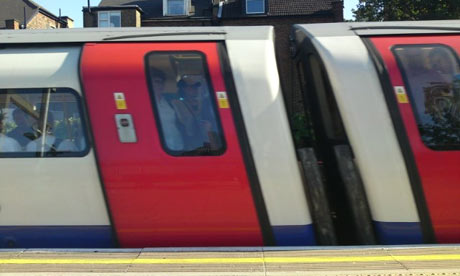Bus and tube fares to rise by average of 12.7% and 3.9%, and congestion charge to increase by £2, Boris Johnson says

Fares on London's underground and buses will rise by an average of 3.9% and 12.7% respectively. Photograph: Paul Owen
The London mayor, Boris Johnson, has announced sharp rises in bus and tube fares and the congestion charge to help plug a multimillion-pound hole in transport funding in the capital.
London bus fares would rise by an average of 12.7% from January 2010 while tube fares would rise by an average of 3.9%.
Unions and commuter groups reacted angrily to the plans, which included a delay to some improvement projects.
The daily congestion charge for vehicles entering central London would rise by £2 to £10, but drivers who used a new automatic payment system would be charged £9.
Transport for London (TfL) said Johnson was still "minded" to scrap the western extension to the congestion charge zone and would make a final decision next spring.
Oyster pay-as-you-go fares on buses would rise by 20p to £1.20 while a single underground trip in zone one would jump by 20p to £1.80. The cost of a seven-day bus pass would rise from £13.80 to £16.60.
Johnson said he was asking Londoners "to accept this difficult decision" to safeguard the investment in London's future.
The announcement comes at a time when there is a £1.7bn funding gap in TfL's finances over the next three years, with £900m of this due to the recession.
"Nobody wants to make an announcement like this, especially when Londoners are feeling the effects of the recession," Johnson said.
He sought to blame the rises on the recession and his predecessor, Ken Livingstone.
"The mistakes of the past and the current economic climate have conspired to present us with a huge challenge."
Johnson said he had been persuaded of the need for fare rises only after ensuring that every efficiency possible – at least a £5bn saving – was being made at TfL.
Justifying the increase in an article in the Evening Standard, Johnson wrote: "We are coping with the colossal costs of the failure of Metronet and the disastrous PPP, and we are dealing with the costs of years of irresponsible politically motivated jiggery-pokery in setting fares".
The rises come at time when many Londoners face a pay freeze and the retail price index is running at -1.4%, and on top of a 6% increase in fares this year.
The economic downturn has resulted in a fall in passengers numbers, with the number of tube users dropping by 6.4% in August.
The fall in revenue comes when TfL is struggling to complete an ambitious project to upgrade the underground network and provide new services.
TfL's business plan, to be considered by its board next week, includes the deferral by three years of all remaining station renewals that were to have been completed by the failed tube maintenance company Metronet. Work to upgrade Victoria, one of the tube's busiest stations, will not now be completed until 2018 and there will be some limited reductions made to bus and tube services.
Sharon Grant, chair of the commuter watchdog London TravelWatch, said the rises were unacceptable.
"We are particularly appalled at the 20% rise in single bus fares, and the rise of a single Oyster trip in zone 1," she said. "While the freeze on the price of a weekly Travelcard is welcome, it appears that infrequent, irregular users, such as part-time workers, will be disproportionately punished. It is these people who may well decide not to use public transport, not travel at all, or use their car instead."
Bob Crow, the general secretary of the RMT, the union representing tube drivers, said the rises would deepen the financial problems by driving people away from public transport.
"A large chunk of the multibillion financial black hole facing TfL is a direct result of the failure of tube privatisation," he said.
"Passengers and staff are being asked to pay a heavy price for the failures of politicians and it is no surprise that they are angry at these heavyweight fare increases."

